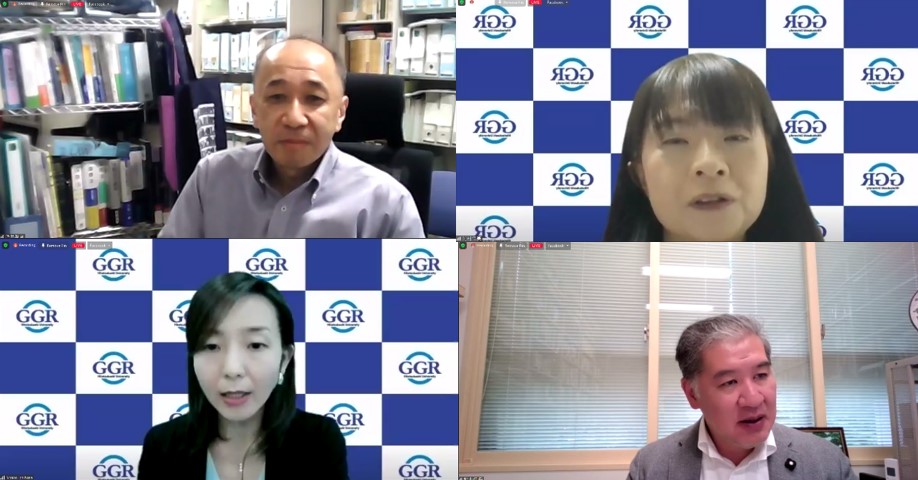The Institute for Global Governance Research (GGR) hosted a webinar titled “Justice in the Russo-Ukrainian War: Perspectives from International Law and Norms” on June 8, 2022. This GGR webinar invited Professor Hironobu SAKAI (Graduate School of Law, Kyoto University), Associate Professor Hitomi TAKEMURA (Graduate School of Law, Hitotsubashi University) and Professor Maiko ICHIHARA (Graduate School of Law, Hitotsubashi University) as panelists, and Professor Nobumasa AKIYAMA (Dean of the School of International and Public Policy, Hitotsubashi University) as the moderator.
The webinar kicked off with questions posed to the audience. To the question of “Which actor do you think should be held accountable for Russia’s aggression in Ukraine?” the overwhelming majority responded “Russia,” but 10% each chose Ukraine, the US, and NATO. The event then moved to the panel session, which opened a discussion on aggression in international law, the relationship between justice and international law, the possibility of punishing war crimes, and how norms and international order can be maintained from the perspective of international politics.
Regarding the question of what constitutes “aggression” from the viewpoint of international law, Professor Hironobu SAKAI addressed the significance of regulation by “law” rather than “justice.” After explaining the process from “just war” to the outlawing of war, he referred to the UN General Assembly resolution of this year that recognized Russia’s military actions as aggression based on the principle of the prohibition of the use of force and other factors. He expressed the opinion that evaluating war and talking about justice (during the war) may give good reasons for a war as a means of causing change in the international order.
As to the possibility of the Ukrainian situation being adjudicated by the International Criminal Court (ICC), Associate Professor Hitomi TAKEMURA pointed out that while Ukraine has declared its acceptance of jurisdiction, the ICC can investigate only war crimes, crimes against humanity, and genocide (excluding crimes of aggression). In light of the difficulties in securing the custody of the current head of state, she also pointed out that the cooperation of the countries concerned is indispensable to further enhance the effectiveness of the Court. She then referred to the interests of justice and related matters to be taken into consideration, and the significance of the ICC since the Nürnberg and Tokyo Trials.
Lastly, Professor Maiko ICHIHARA noted that Ukraine’s defense against Russian aggression is linked to the maintenance of the international order as an action that does not recognize the act of aggression itself, and that it is important for the international community to make a clear exception to such acts in the event of a war of aggression. She also noted the importance of states as members of the international community continuing to demonstrate their commitment to norms and not giving up on the concept of the state by maintaining the sovereignty norms, given that a free and inclusive society is based on order.
Notable remarks
- There are many questions, but I believe that these are not simply issues of power politics among states, but that the laws and norms that mankind has developed in the long pursuit of peace in the international community have their own implications (by Professor Nobumasa AKIYAMA).
- Regarding justice and law in the international community, justice often in fact precedes law. However, it will be difficult to rely on justice. It is a reality that the international community is driven by states. It is in this context that [international law] develops as law, and it is important to manage somehow to keep that gradually developing law on track and to make the states abide by it (by Professor Hironobu SAKAI).
- Traditionally, the postwar process has been conducted between countries, but if the responsibility of a country is pursued and the process is handled in a way that specifies which country is to blame, it can leave hatred between countries and nations. The significance of having a permanent International Criminal Court, rather than an ad hoc court, is that it overcomes national sentiment by limiting this issue to individuals, and I believe that this will ensure the fairness of the trial and equal application of the law (by Associate Professor Hitomi TAKEMURA).
- In domestic societies, institutions exist and have coercive power over their members, and order can be maintained by punishing and making exceptions to these institutions. In the international community, there is no government above the member states, so how order is brought about is through the maintenance of norms by the sovereign states that are members of the community and committed to those norms (by Professor Maiko ICHIHARA).
【Event report prepared by】
JEONG Minhee(Ph.D. student, Graduate School of Law, Hitotsubashi University)

